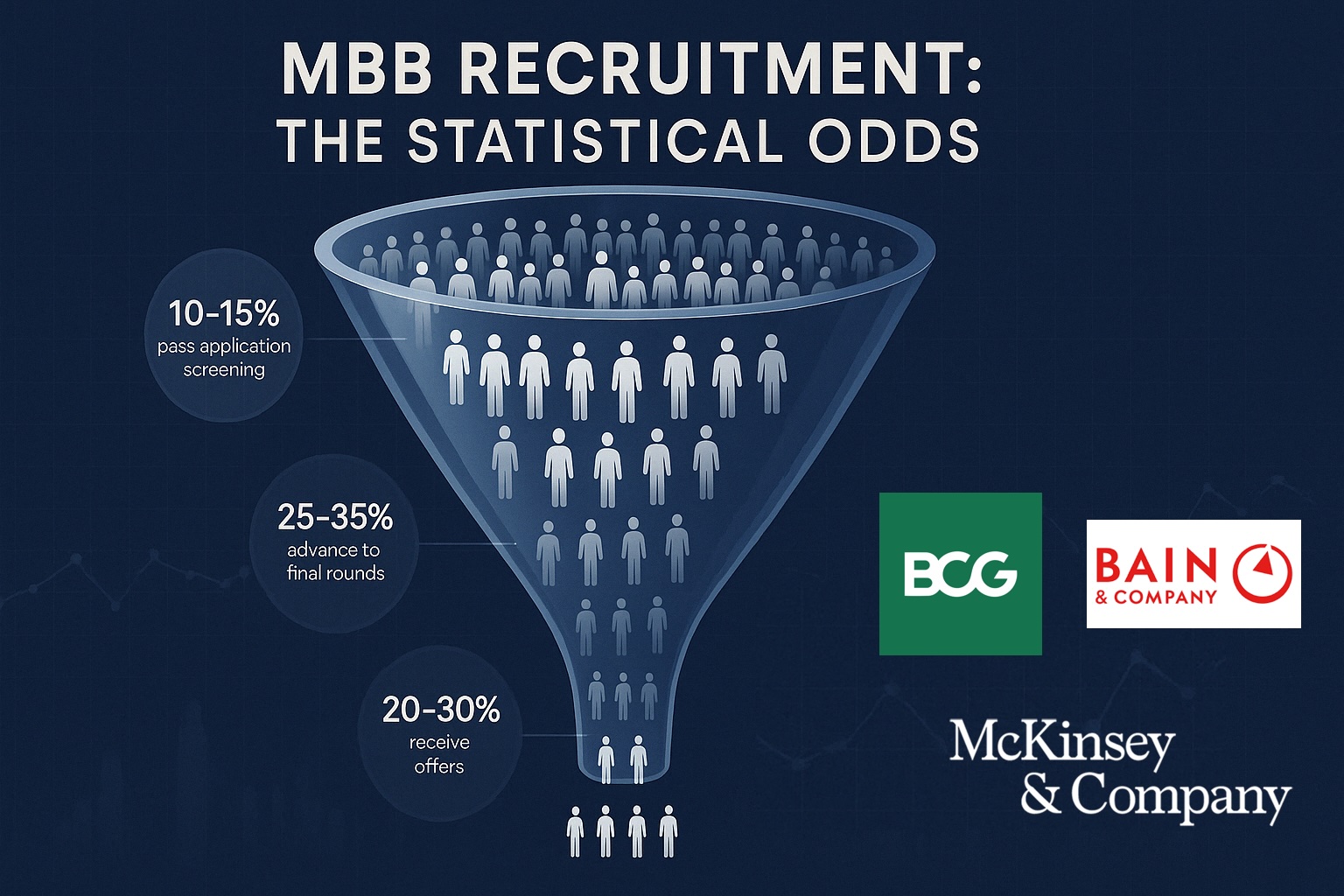
The Ultimate Guide to Case Interview Preparation: Strategies for Success in 2025
In the competitive world of management consulting, the case interview stands as the defining hurdle between candidates and their dream jobs. Whether you're aiming for McKinsey, BCG, Bain, or boutique firms like Kearney, mastering the case interview is non-negotiable. This comprehensive guide will walk you through everything you need to know about case interview preparation, providing actionable strategies to help you demonstrate your problem-solving abilities and secure that coveted offer.
What Is a Case Interview?
A case interview is a problem-solving exercise designed to test an applicant's ability to tackle business challenges under pressure. Interviewers present candidates with a hypothetical business scenario and assess how they:
- Structure and analyze complex problems
- Apply logical reasoning to develop solutions
- Communicate clearly and confidently
- Leverage quantitative skills for data-driven decisions
- Navigate ambiguity and adapt to new information
As one resource accurately describes it: "Interviewers present a hypothetical business challenge and assess how you explore the problem and conceptualize and structure a solution." The case typically mirrors real-world consulting projects, allowing firms to evaluate your potential performance on the job.
Why Case Interviews Matter
Case interviews serve as the ultimate test of strategy and executive communication. They account for approximately 80% of your first-round evaluation and 50% of your second-round scoring, making them the most significant filter in the consulting recruitment process. At top firms like McKinsey, fewer than 10% of interviewees receive offers, underscoring the importance of thorough preparation.
Understanding the Case Interview Process
Typical Structure
Most consulting firms follow a similar interview format:
- Initial Screening: Resume review and potentially a phone interview
- First Round: 1-2 case interviews (30-60 minutes each)
- Final Round: 2-3 additional case interviews with more senior interviewers
Each interview typically begins with 5-15 minutes of behavioral questions ("fit interview"), followed by 20-40 minutes of case discussion.
What Firms Are Looking For
Consulting firms assess candidates across multiple dimensions:
- Structured thinking: Can you organize your thoughts logically and approach problems systematically?
- Business acumen: Do you understand fundamental business concepts and industry dynamics?
- Quantitative skills: Can you perform calculations accurately and interpret data effectively?
- Communication: Can you articulate your thoughts clearly and confidently?
- Adaptability: How well do you respond to new information or challenging questions?
- Creativity: Can you generate innovative solutions to complex problems?
Key Components of a Case Interview
1. Information Gathering
The interviewer presents the business problem and goal. Your task is to:
- Take comprehensive notes
- Summarize the information to confirm understanding
- Ask clarifying questions to eliminate ambiguity
- Gather context about the industry and relevant market dynamics
2. Problem Structuring
After understanding the problem, you'll need to develop a framework to organize your analysis:
- Ask for a moment to structure your thoughts
- Create a custom framework tailored to the specific case
- Communicate your approach clearly to the interviewer
- Avoid rigidly applying memorized frameworks
3. Analysis
This phase involves:
- Breaking down complex problems into manageable components
- Requesting relevant data from the interviewer
- Identifying key drivers and relationships
- Testing hypotheses and adjusting your approach as needed
4. Quantitative Problem Solving
Most cases include calculations to test your numerical abilities:
- Mental math for basic operations
- Written calculations for more complex problems
- Data interpretation and analysis
- Market sizing and estimation
5. Recommendations
The culmination of your analysis, where you:
- Present a clear, decisive recommendation
- Support your conclusion with key findings
- Address potential implementation challenges
- Suggest next steps or additional considerations
Essential Case Interview Frameworks
While you should avoid rigidly applying pre-memorized frameworks, understanding these common structures provides a foundation for your approach:
Profitability Framework
A fundamental framework examining revenue and cost drivers:
Revenue = Price × Volume Profit = Revenue − Costs (Fixed and Variable)
This framework is particularly useful for cases involving declining profits, pricing strategy, or cost optimization.
Market Study Framework
Focuses on external factors affecting a business:
- Market size and growth
- Customer segments and preferences
- Competitive landscape
- Regulatory environment
Ideal for market entry, product launch, or expansion cases.
Mergers & Acquisitions Framework
Helps evaluate potential corporate transactions by considering:
- Strategic fit and synergies
- Valuation and financial impact
- Integration challenges
- Regulatory concerns
Other Useful Frameworks
- 3Cs Framework: Company, Customers, Competition
- 4Ps Marketing Mix: Product, Price, Place, Promotion
- Porter's Five Forces: Analyzing industry competitiveness
Remember: The best framework is one tailored specifically to the case at hand, drawing elements from these standard approaches but customized to address the unique problem presented.
Mastering Quantitative Skills
Numerical proficiency is crucial for case interviews. Consulting firms expect candidates to:
- Perform basic calculations mentally (addition, subtraction, multiplication, division)
- Analyze percentages and growth rates
- Estimate market sizes using logical assumptions
- Interpret data to draw meaningful conclusions
Practice Tips:
- Perform calculations by hand instead of using calculators
- Practice mental math daily (calculating tips, analyzing prices, etc.)
- Work through estimation problems regularly
- Double-check your calculations for accuracy
Communication Strategies
How you communicate during a case interview is as important as what you say:
- Think aloud: Share your reasoning process with the interviewer
- Structure your responses: Begin with the conclusion, then provide supporting evidence
- Use clear, concise language: Avoid jargon and unnecessary complexity
- Maintain engagement: Make eye contact and show enthusiasm
- Listen actively: Pay attention to the interviewer's guidance and feedback
Common Case Types
Prepare for these frequently encountered case scenarios:
- Profitability Cases: Why are profits declining, and how can we improve them?
- Market Entry: Should our client enter a new market or launch a new product?
- Growth Strategy: How can our client increase revenue or market share?
- Cost Reduction: Where can our client cut costs without sacrificing quality?
- Pricing Strategy: How should our client price their products or services?
- Mergers & Acquisitions: Should our client acquire or merge with another company?
Effective Preparation Strategies
Short-Term Preparation (1-2 Weeks)
If you have limited time before your interview:
- Focus on fundamentals: Master the basic frameworks and quantitative skills
- Practice daily: Complete at least one full case per day
- Prioritize weaknesses: Identify and address your most significant gaps
- Record yourself: Practice articulating your thoughts clearly
- Drill calculations: Spend 15-30 minutes daily on mental math exercises
Long-Term Preparation (1-6 Months)
For a more comprehensive approach:
- Study case fundamentals: Read case interview guides and resources
- Build business acumen: Follow business news and industry trends
- Practice regularly: Aim for 30-50 full practice cases before your interviews
- Find practice partners: Work with others to simulate the interview environment
- Seek expert feedback: Consider coaching from experienced consultants
- Review fundamentals: Ensure your frameworks and calculations are second nature
- Develop your storytelling: Prepare compelling examples for behavioral questions
Essential Resources for Preparation
Successful case interview preparation depends on accessing the right materials and practice opportunities. Here are key resources to consider:
Knowledge Resources
- Books: Classic guides like "Case in Point" and "Case Interview Secrets" provide solid foundations
- Consulting firm websites: Most major firms offer free case examples and interview tips
- Business publications: Following outlets like Financial Times and Harvard Business Review builds business acumen
Practice Partners
- University consulting clubs: Connect with fellow students preparing for similar interviews
- Online communities: Platforms like PrepLounge and r/consulting help find remote practice partners
- Alumni networks: Reach out to graduates working in consulting for insights and practice
- AI practice tools: Technology platforms that simulate case interviews offer on-demand practice
Feedback Sources
- Peer review: Exchange feedback with practice partners using structured evaluation criteria
- Recorded sessions: Review your own performance by recording practice interviews
- Expert coaching: Consider professional coaches for targeted improvement (though this can often be very costly)
- University resources: Career centers and consulting clubs often provide workshop opportunities
Final Tips for Interview Day
- Arrive early and mentally prepared
- Bring a notebook and pen for taking notes
- Listen carefully to the problem statement
- Ask clarifying questions when needed
- Structure before diving in to analysis
- Stay calm if you make a mistake
- Be adaptable to new information
- Engage with the interviewer as a potential colleague
- End with a clear recommendation supported by your analysis
Conclusion
Case interview preparation requires dedication, practice, and strategic thinking. By understanding the structure, mastering key frameworks, developing your quantitative skills, and refining your communication abilities, you can significantly increase your chances of success.
Remember that interviewers are not just evaluating your ability to solve the case – they're assessing whether you demonstrate the skills and qualities needed to excel as a consultant. Approach each practice case as an opportunity to develop these skills, and you'll be well-positioned to impress in your interviews and launch your consulting career.
Good luck!
Taking Your Practice to the Next Level
While traditional practice methods remain valuable, serious candidates often face common obstacles:
- Scheduling conflicts make consistent practice with partners difficult
- Quality feedback is hard to obtain, especially from peers with similar experience levels
- Last-minute cancellations disrupt preparation momentum
- Limited opportunities to practice speaking through cases naturally
This is where PrepPartner.ai is transforming case interview preparation. This AI-powered platform offers significant advantages:
- On-demand practice: Access realistic case interviews 24/7 without scheduling hassles
- Natural voice interaction: Speak through cases as you would in a real interview - no typing, just turn your camera and mic on
- Personalized feedback: Receive detailed, objective analysis after every session
- Affordable access: Premium preparation for less than £10 per week
Many successful candidates now combine traditional preparation methods with AI-powered practice to maximize their interview readiness. The ability to rapidly iterate through cases, receive immediate feedback, and practice at your convenience provides a significant competitive advantage in an increasingly demanding recruitment process.
Whether your interview is months away or just days from now, incorporating tools like PrepPartner.ai into your preparation strategy can help you develop the confidence, structure, and communication skills that top consulting firms demand.
 PrepPartner TeamPrepPartnerWhat Are Consulting Case Interviews? (2025 Guide)A comprehensive guide to understanding case interviews, their structure, and how to prepare for them in 2025.Read More
PrepPartner TeamPrepPartnerWhat Are Consulting Case Interviews? (2025 Guide)A comprehensive guide to understanding case interviews, their structure, and how to prepare for them in 2025.Read More PrepPartner TeamPrepPartnerWhat Are Your Chances of Getting a Job at MBB? Breaking Down the Recruitment OddsA data-driven analysis of your statistical odds at each stage of the McKinsey, BCG, and Bain (MBB) consulting recruitment process, with insights for undergraduates, MBAs, and experienced hires.Read More
PrepPartner TeamPrepPartnerWhat Are Your Chances of Getting a Job at MBB? Breaking Down the Recruitment OddsA data-driven analysis of your statistical odds at each stage of the McKinsey, BCG, and Bain (MBB) consulting recruitment process, with insights for undergraduates, MBAs, and experienced hires.Read More PrepPartner TeamPrepPartnerHow Long are Case Interviews?This guide explains how long case interviews last at top consulting firms like McKinsey, BCG, and Bain, with a detailed breakdown of timing by interview round and firm.Read More
PrepPartner TeamPrepPartnerHow Long are Case Interviews?This guide explains how long case interviews last at top consulting firms like McKinsey, BCG, and Bain, with a detailed breakdown of timing by interview round and firm.Read More